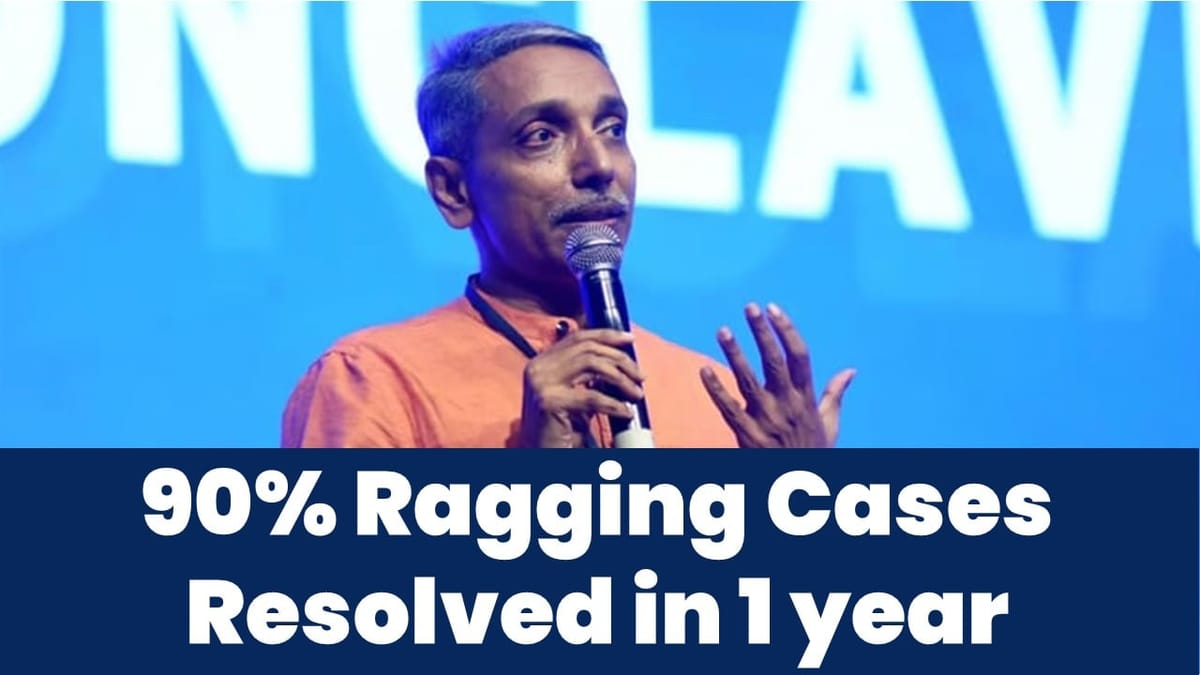Shubhra Goswamy | May 3, 2024 |

UGC Chief Says 90% Ragging cases settled in a year
The University Grants Commission (UGC) has settled 1113 cases or 89.76% of the 1240 ragging occurrences that were recorded in Higher Educational Institutions (HEIs) during the last year.
According to UGC Chairman Prof. M. Jagadesh Kumar, men reported the majority of ragging incidents—more than 82%—between 1st January 2023, and 28th April of this year.
According to Kumar, who spoke with The New Indian Express, the nearly 90% of ragging cases that were successfully resolved show how committed the UGC and the institutions are to handling ragging complaints as soon as they arise and assisting in creating a welcoming and safe learning environment for all students in Indian universities and colleges.
The UGC intends to promptly address the 127 active complaints, or 10.24% of the total, that are currently pending.
82.18% of men, 17.74% of women, and 0.08% of transgender persons reported ragging occurrences, according to the data. These grievances were filed at the UGC anti-ragging cell as well as through the dedicated toll-free anti-ragging helpline (1800-180-5522).
In accordance with the Supreme Court’s 2009 ruling, the 24-hour helpline was established.
As per the orders of the Supreme Court in its 2009 verdict, the UGC has requested that the states set up district-level bodies to address the issue of ragging in higher education institutions.
The district collector/district magistrate, the university president, the superintendent of police, another district magistrate, representatives from the local media, student organizations, and others are among the stakeholders that are involved in these committees.
These district committees’ purpose is to ensure prompt response in the event of a complaint and to proactively avoid raging situations.
“Bringing together diverse stakeholders will help create better communication and coordinated efforts between educational institutions, law enforcement agencies, and anti-ragging squads,” Prof Kumar said.
In addition to the helpline number, students can use the protected UGC portal, www.antiragging.in, to anonymously lodge concerns. By email, students can reach UGC helpline@antiragging.in. When possible, the UGC takes suo moto action in addition to keeping an eye on news articles and social media sites for instances of ragging.
Students are given a unique ID to follow their complaints once they are registered.
The chiefs of the institutions and the police are also notified of the complaint, and they will begin an immediate inquiry.
Additionally, the helpline remains active throughout and guarantees that a comprehensive investigation is conducted. The complainant—whose identity is kept confidential—is given access to the reports, and the UGC reserves the right to reopen the investigation if necessary.
“Students should report instances of bullying with confidence, as the UGC is dedicated to providing a secure and encouraging learning environment for every student,” he stated.
“The extensive surveillance system sends a clear message to institutions that ragging is not permitted. This produces a stronger deterrent impact and inhibits future episodes. By actively combating ragging, UGC hopes to foster a learning atmosphere that values mutual respect, inclusivity, and well-being for all students,” added the UGC chairman.
The UGC works with an independent NGO in accordance with the SC’s instruction to keep an eye on anti-ragging complaints and make sure universities are honoring their commitments to stop ragging.
“Students are urged by UGC to report any instances of bullying they may come across or experience by calling the anti-bullying hotline. We can eliminate this threat and establish a respectful and dignified atmosphere on our campuses if we band together,” he continued.
Additionally, UGC has published the 2009 Regulations on Taming the Epidemic of Ragging in Higher Educational Institutions, which emphasize the illegality of ragging and require its prevention, restriction, and abolition in HEIs.
In case of any Doubt regarding Membership you can mail us at contact@studycafe.in
Join Studycafe's WhatsApp Group or Telegram Channel for Latest Updates on Government Job, Sarkari Naukri, Private Jobs, Income Tax, GST, Companies Act, Judgements and CA, CS, ICWA, and MUCH MORE!"